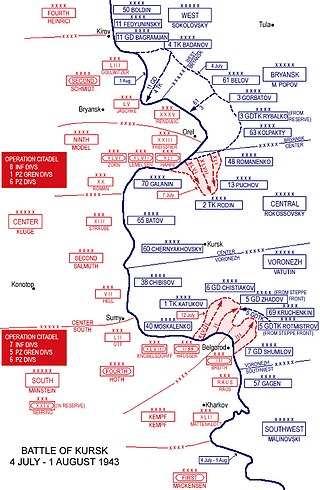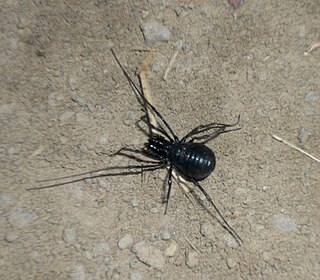Related Research Articles

The Battle of Kursk was a major World War II Eastern Front large-scale engagement between the forces of Nazi Germany and the Soviet Union near Kursk in the southwestern USSR during late summer 1943; it ultimately became the largest tank battle in history.

The Panzer I was a light tank/tankette produced in Nazi Germany in the 1930s. Its name is short for Panzerkampfwagen I, abbreviated as PzKpfw I. The tank's official German ordnance inventory designation was Sd.Kfz. 101.

The Panzerkampfwagen III, commonly known as the Panzer III, was a medium tank developed in the 1930s by Germany, and was used extensively in World War II. The official German ordnance designation was Sd.Kfz. 141. It was intended to fight other armoured fighting vehicles and serve alongside and support the similar Panzer IV, which was originally designed for infantry support. However, as the Germans faced the formidable T-34, more powerful anti-tank guns were needed, and since the Panzer IV had more development potential with a larger turret ring, it was redesigned to mount the long-barrelled 7.5 cm KwK 40 gun. The Panzer III effectively swapped roles with the Panzer IV, as from 1942 the last version of the Panzer III mounted the 7.5 cm KwK 37 L/24 that was better suited for infantry support. Production of the Panzer III ceased in 1943. Nevertheless, the Panzer III's capable chassis provided hulls for the Sturmgeschütz III assault gun until the end of the war.

The Panzerkampfwagen IV, commonly known as the Panzer IV, was a German medium tank developed in the late 1930s and used extensively during the Second World War. Its ordnance inventory designation was Sd.Kfz. 161.

A Panzer division was one of the armored (tank) divisions in the army of Nazi Germany during World War II. Panzer divisions were the key element of German success in the blitzkrieg operations of the early years of World War II. Later the Waffen-SS formed its own panzer divisions, and even the Luftwaffe fielded an elite panzer division: the Hermann Göring Division.

Georg Wolfgang Franz Panzer was a German botanist and entomologist.

Ischyropsalididae is a family of harvestmen with 31 described species in 3 genera, found in Europe and North America.

Nebria is a genus of ground beetles native to the Palearctic, the Near East and North Africa.

Nebria livida is a species of ground beetle with two subspecies:

This article deals with the tanks serving in the German Army throughout history, such as the World War I tanks of the Imperial German Army, the interwar and World War II tanks of the Nazi German Wehrmacht, the Cold War tanks of the West German and East German Armies, all the way to the present day tanks of the Bundeswehr.

Nebriinae is a subfamily of beetles in the family Carabidae, containing the following genera:
Nebria hellwigii chalcicola is a subspecies of beetle in the family Carabidae that is endemic to Austria.
Nebria hellwigii hellwigii is a subspecies of beetle in the family Carabidae found in Austria, Germany, and Italy.
Nebria hellwigii is a species of ground beetle in the Nebriinae subfamily that is endemic to Greece.
Nebria cordicollis is a species of black coloured ground beetle from Nebriinae subfamily that can be found in Italy and Switzerland. The species is 5 millimetres (0.20 in) long.

Ischyropsalis is a genus of harvestmen in the family Ischyropsalididae, found in Europe. There are more than 20 described species in Ischyropsalis.
Cephalcia is a genus of insects belonging to the family Pamphiliidae.
References
- ↑ "Nebria (Nebria) hellwigii Panzer, 1803". Carabidae of the World. Retrieved November 8, 2012.